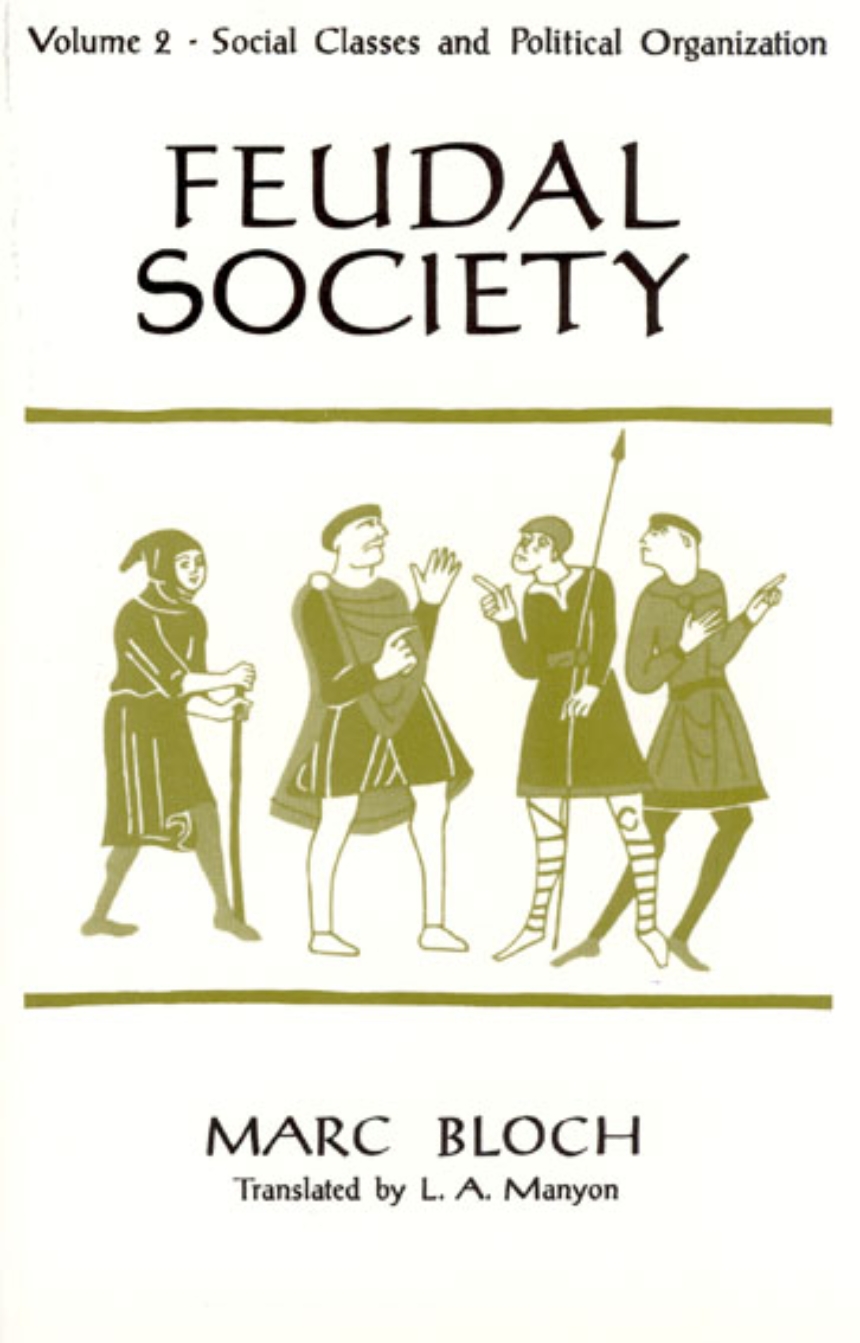Feudal Society, Volume 2
Table of Contents
Social Classes and Political Organization
Introductory Note
Part VI - Social Classes
XXI. The Nobles as a ’De Facto’ Class
1. The Disappearance of the Ancient Aristocracies of Birth
2. Different Meanings of the World ’Noble’ in the First Feudal Age
3. The Noble Class a Class of Lords
4. The Profession of Arms
XXII. The Life of the Nobility
1. War
2. The Noble at Home
3. Occupations and Distractions
4. Rules of Conduct
XXIII. Chivalry
1. Dubbing to Knighthood
2. The Code of Chivalry
XXIV. Transformation of the Nobility into a Legal Class
1. The Inheritance of Knighthood and Nobility
2. The Descendants of Knights become a Privileged Class
3. The Law of the Nobles
4. The Exceptional Case of England
XXV. Class Distinctions within the Nobility
1. Gradations of Power and Rank
2. Serjeants and Serf-Knights
XXVI. Clergy and Burgesses
1. The Ecclesiastical Society within the Feudal World
2. The Burgesses
Part VII - Political Organizations
XXVII. Judicial Institutions
1. General Characteristics of the Judicial System
2. The Disintegration of Judicial Authority
3. Trial by Peers or Trial by the Lord
4. On the Edge of Disintegration: Survivals and New Factors
XXVIII. The Traditional Powers: Kingdoms and Empire
1. Geographical Distribution of the Monarchies
2. Traditions and Nature of the Royal Power
3. The Transmission of the Royal Power: Dynastic Problems
4. The Empire
XXIX. From Territorial Principalities to Castellanies
1. The Territorial Principalities
2. Counties and Castellanies
3. The Ecclesiastical Lordships
XXX. Disorder and the Efforts to Combat It
1. The Limits of State Action
2. Violence and the Longing for Peace
3. The Peace and Truce of God
XXXI. Towards the Reconstruction of States: National Developments
1. Reasons for the Reconcentration of Authority
2. A New Monarchy: The Capetians
3. An Archaistic Monarchy: Germany
4. The Anglo-Norman Monarchy: Conquest and Germanic Survivals
5. Nationalities
Part VIII - Feudalism as a Type of Society and Its Influence
XXXII. Feudalism as a Type of Society
1. Has there been more than one Feudalism?
2. The Fundamental Characteristics of European Feudalism
3. A Cross-Section of Comparative History
XXXIII. The Persistence of European Feudalism
1. Survivals and Revivals
2. The Warrior Idea and the Idea of Contract
Bibliography
Supplement to the Bibliography by L. A. Manyon
Index
Introductory Note
Part VI - Social Classes
XXI. The Nobles as a ’De Facto’ Class
1. The Disappearance of the Ancient Aristocracies of Birth
2. Different Meanings of the World ’Noble’ in the First Feudal Age
3. The Noble Class a Class of Lords
4. The Profession of Arms
XXII. The Life of the Nobility
1. War
2. The Noble at Home
3. Occupations and Distractions
4. Rules of Conduct
XXIII. Chivalry
1. Dubbing to Knighthood
2. The Code of Chivalry
XXIV. Transformation of the Nobility into a Legal Class
1. The Inheritance of Knighthood and Nobility
2. The Descendants of Knights become a Privileged Class
3. The Law of the Nobles
4. The Exceptional Case of England
XXV. Class Distinctions within the Nobility
1. Gradations of Power and Rank
2. Serjeants and Serf-Knights
XXVI. Clergy and Burgesses
1. The Ecclesiastical Society within the Feudal World
2. The Burgesses
Part VII - Political Organizations
XXVII. Judicial Institutions
1. General Characteristics of the Judicial System
2. The Disintegration of Judicial Authority
3. Trial by Peers or Trial by the Lord
4. On the Edge of Disintegration: Survivals and New Factors
XXVIII. The Traditional Powers: Kingdoms and Empire
1. Geographical Distribution of the Monarchies
2. Traditions and Nature of the Royal Power
3. The Transmission of the Royal Power: Dynastic Problems
4. The Empire
XXIX. From Territorial Principalities to Castellanies
1. The Territorial Principalities
2. Counties and Castellanies
3. The Ecclesiastical Lordships
XXX. Disorder and the Efforts to Combat It
1. The Limits of State Action
2. Violence and the Longing for Peace
3. The Peace and Truce of God
XXXI. Towards the Reconstruction of States: National Developments
1. Reasons for the Reconcentration of Authority
2. A New Monarchy: The Capetians
3. An Archaistic Monarchy: Germany
4. The Anglo-Norman Monarchy: Conquest and Germanic Survivals
5. Nationalities
Part VIII - Feudalism as a Type of Society and Its Influence
XXXII. Feudalism as a Type of Society
1. Has there been more than one Feudalism?
2. The Fundamental Characteristics of European Feudalism
3. A Cross-Section of Comparative History
XXXIII. The Persistence of European Feudalism
1. Survivals and Revivals
2. The Warrior Idea and the Idea of Contract
Bibliography
Supplement to the Bibliography by L. A. Manyon
Index
